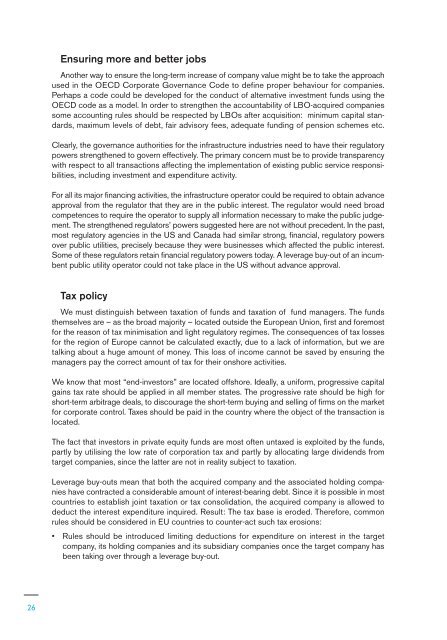Hedge funds and Private Equity - PES
Hedge funds and Private Equity - PES
Hedge funds and Private Equity - PES
You also want an ePaper? Increase the reach of your titles
YUMPU automatically turns print PDFs into web optimized ePapers that Google loves.
26<br />
Ensuring more <strong>and</strong> better jobs<br />
Another way to ensure the long-term increase of company value might be to take the approach<br />
used in the OECD Corporate Governance Code to define proper behaviour for companies.<br />
Perhaps a code could be developed for the conduct of alternative investment <strong>funds</strong> using the<br />
OECD code as a model. In order to strengthen the accountability of LBO-acquired companies<br />
some accounting rules should be respected by LBOs after acquisition: minimum capital st<strong>and</strong>ards,<br />
maximum levels of debt, fair advisory fees, adequate funding of pension schemes etc.<br />
Clearly, the governance authorities for the infrastructure industries need to have their regulatory<br />
powers strengthened to govern effectively. The primary concern must be to provide transparency<br />
with respect to all transactions affecting the implementation of existing public service responsibilities,<br />
including investment <strong>and</strong> expenditure activity.<br />
For all its major financing activities, the infrastructure operator could be required to obtain advance<br />
approval from the regulator that they are in the public interest. The regulator would need broad<br />
competences to require the operator to supply all information necessary to make the public judgement.<br />
The strengthened regulators’ powers suggested here are not without precedent. In the past,<br />
most regulatory agencies in the US <strong>and</strong> Canada had similar strong, financial, regulatory powers<br />
over public utilities, precisely because they were businesses which affected the public interest.<br />
Some of these regulators retain financial regulatory powers today. A leverage buy-out of an incumbent<br />
public utility operator could not take place in the US without advance approval.<br />
Tax policy<br />
We must distinguish between taxation of <strong>funds</strong> <strong>and</strong> taxation of fund managers. The <strong>funds</strong><br />
themselves are – as the broad majority – located outside the European Union, first <strong>and</strong> foremost<br />
for the reason of tax minimisation <strong>and</strong> light regulatory regimes. The consequences of tax losses<br />
for the region of Europe cannot be calculated exactly, due to a lack of information, but we are<br />
talking about a huge amount of money. This loss of income cannot be saved by ensuring the<br />
managers pay the correct amount of tax for their onshore activities.<br />
We know that most “end-investors” are located offshore. Ideally, a uniform, progressive capital<br />
gains tax rate should be applied in all member states. The progressive rate should be high for<br />
short-term arbitrage deals, to discourage the short-term buying <strong>and</strong> selling of firms on the market<br />
for corporate control. Taxes should be paid in the country where the object of the transaction is<br />
located.<br />
The fact that investors in private equity <strong>funds</strong> are most often untaxed is exploited by the <strong>funds</strong>,<br />
partly by utilising the low rate of corporation tax <strong>and</strong> partly by allocating large dividends from<br />
target companies, since the latter are not in reality subject to taxation.<br />
Leverage buy-outs mean that both the acquired company <strong>and</strong> the associated holding companies<br />
have contracted a considerable amount of interest-bearing debt. Since it is possible in most<br />
countries to establish joint taxation or tax consolidation, the acquired company is allowed to<br />
deduct the interest expenditure inquired. Result: The tax base is eroded. Therefore, common<br />
rules should be considered in EU countries to counter-act such tax erosions:<br />
Rules should be introduced limiting deductions for expenditure on interest in the target<br />
company, its holding companies <strong>and</strong> its subsidiary companies once the target company has<br />
been taking over through a leverage buy-out.




